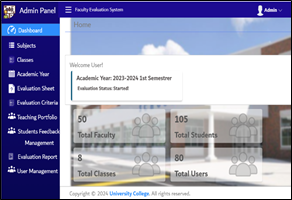Streamlining Faculty Evaluations: A Web-Based System for Enhanced Efficiency and Data-Driven Insights
DOI:
https://doi.org/10.69478/JITC2024v6n002a04Keywords:
Faculty evaluation, Collaborative feedback, Peer observation, Faculty development, Teaching qualityAbstract
Faculty evaluation is critical for improving teaching and student learning. Traditional methods, often reliant on student surveys, lack detail, and miss perspectives. This paper explores a Web-based Faculty Evaluation System (WFES) that leverages collaborative feedback to enhance teaching quality. The proposed WFES goes beyond traditional methods by incorporating multiple sources. It facilitates online student feedback through targeted surveys, self-reflection tools, and potentially integrated peer observation. This enriches the evaluation process with diverse viewpoints. A key benefit is efficient data collection. Online surveys and self-reflection tools reduce administrative burdens and streamline evaluation. Data analysis can identify areas for improvement, inform professional development, and target feedback for faculty. The collaborative nature fosters a culture of continuous improvement. By incorporating student, potentially peer, and self-reflection feedback, the system provides valuable insights for faculty, leading to more informed teaching practices and ultimately benefiting student learning. This research evaluates the implemented WFES using the ISO/IEC 25010 model. A web-based survey gathered feedback from a diverse group. The evaluation yielded promising results, with the WFES achieving a high overall score. However, areas for improvement in resource utilization and user interface design were identified. This research informs future development strategies to refine functionalities, enhance user experience, and ultimately strengthen faculty evaluation effectiveness.
References
T. J. Fogarty, G. A. Jonas, L. M. Parker, “The Medium is the Message: Comparing Paper-Based and Web-Based Course Evaluation Modalities,” Journal of Accounting Education, vol. 31, no. 2, June 2013, pp. 177-193, https://doi.org/10.1016/j.jaccedu.2013.03.002.
A. McFadden, K. E. Williams, “Teachers as Evaluators: Results from a Systematic Literature Review,” Studies in Educational Evaluation, vol. 64, March 2020, https://doi.org/10.1016/j.stueduc.2019.100830.
A. L. Alix, D. J. Datul, M. C. Fernando-Raguro, A. C. Lagman, R. T. Adao, “Faculty Evaluation System Platform with Decision Support Mechanism,” in Proc. of 2022 10th International Conference on Information and Education Technology (ICIET), Matsue, Japan, April 9-11, 2022, pp. 58-63, https://doi.org/10.1109/ICIET55102.2022.9779033.
B. Benosa, J. J. Oñate, “Design and Development of Faculty Performance Evaluation System (FPES) v2. 0,” AIP Conference Proceedings, vol. 2602, no. 1, May 2023, https://doi.org/10.1063/5.0124077.
D. Yulianto, A. R. C. Baswara, L. Alhawariy, M. I. Prasasti, G. A. Hariadi, “Development of Information and Management System of Student Competition Groups through User-Centered Design Approach,” Khazanah Informatika: Jurnal Ilmu Komputer dan Informatika, vol. 9, no. 1, April 2023, pp. 1-8, https://doi.org/10.23917/khif.v9i1.17974
H. L. Chen, C. Y. Chia, “The Effects of Web-Based Peer Assessment and Peer Feedback Quality on Students’ Performances in a Financial Market Course,” TechTrends, vol. 67, May 2023, pp. 664-675, https://doi.org/10.1007/s11528-023-00856-8
M. Amjad, N. J. Linda, “A Web Based Automated Tool for Course Teacher Evaluation System (TTE),” International Journal of Education and Management Engineering, vol. 10, no. 2, April 2020, pp. 11-19, https://doi.org/10.5815/ijeme.2020.02.02
International Organization for Standardization. “ISO/IEC 25010:2011 Systems and software engineering - System and software Quality Requirements and Evaluation (SQRE): Quality models,” https://iso25000.com/index.php/en/iso-25000-standards/iso-25010.
I. Puspitasari, N. Nuzulita, C. S. Hsiao, “Agile User-Centered Design Framework to Support the Development of E-Health for Patient Education,” in Computer and Information Science and Engineering, vol. 16, R. Lee (Ed.), May 2024, pp. 131-144, https://doi.org/10.1007/978-3-031-57037-7_10.
A. Pambudi, W. Apriandari, “An Extreme Programming Approach for Instructor Performance Evaluation System Development,” Journal of Informatics Information System Software Engineering and Applications, vol. 5, no. 2, May 2023, pp. 126-135, https://doi.org/10.20895/inista.v5i2.1050.

Downloads
Published
License
Copyright (c) 2024 Kathleen Mae L. Santillan

This work is licensed under a Creative Commons Attribution-NonCommercial 4.0 International License.



